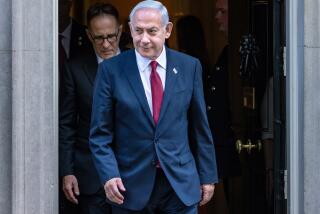MIDEAST : Local Elections a Test for Peace Among Israelis : Municipal contests constitute a small referendum on pact with PLO. Rabin warns failure to vote for Labor candidates might upset peace process.
- Share via
JERUSALEM — Shouting “traitor, traitor,” scores of jeering protesters prevented Israeli Prime Minister Yitzhak Rabin and Jerusalem Mayor Teddy Kollek from campaigning on the principal pedestrian mall here this week, dramatizing the bitter contests under way in Israel’s municipal elections.
“People must understand they are voting on peace,” Rabin said at a later stop where the crowd was friendlier. “A vote for Teddy is a vote for peace; a vote for (challenger Ehud) Olmert is a vote against it.”
Although the issues in most of next Tuesday’s 160 municipal elections are overwhelmingly local, the contests in Jerusalem, Tel Aviv and Haifa, Israel’s major cities, constitute a small referendum on the Rabin government’s agreement with the Palestine Liberation Organization on Palestinian self-government.
“Ignoring the political significance of the local elections is ignoring the facts of life,” Rabin said, arguing that the election of candidates from his Labor Party will be widely read within Israel, by the Palestinians and overseas as endorsement of the autonomy agreement. “Electing a Likud Party candidate in one of the three major cities . . . is likely, in my opinion, to upset the whole peace process.”
Yet most Israelis will vote more on the quality of schools, frequency of garbage collection, maintenance of city streets, opening or closure of movie theaters on the Jewish Sabbath and other supremely local issues.
“Teddy Kollek as the mayor of Jerusalem does have national, even international stature,” said Natan Ben-Zvi, a Jerusalem shopkeeper. “But can he change what Rabin does? No way. So, I’m going to vote for the guy who can make the city run better, make it cleaner, safer and richer.”
Campaigning for Kollek, a Labor Party stalwart, Rabin praised him lavishly. “Teddy must be allowed to continue his lifelong work,” the prime minister said. “Since Herod, there has never been a greater builder of Jerusalem than Teddy Kollek.”
But Olmert in a hard-line campaign has charged Kollek and officials in Rabin’s government with secretly planning the redivision of the city in the eventual peace settlement with the Palestinians, an accusation Kollek’s spokesman rejected as “ridiculous.”
Ben-Zvi, 51, is undecided between Kollek, 83, mayor for 28 years, seeking his seventh term and admittedly tired, and Olmert, 48, who has a reputation for profiting from political connections and who was health minister in the previous Likud government.
“Hard to say who’s better for what lies ahead,” Ben-Zvi said. “This campaign has been so dirty and ugly that I really fear for the city’s future.”
An opinion survey published last week by the polling agency Dahaf showed Kollek leading Olmert, 37% to 35%, among the city’s Jewish voters. Two candidates from ultra-religious parties got 17%; 11% were undecided.
That narrow difference led both men to intensify their campaigns in the city’s large haredi community of strictly observant Orthodox Jews--and Kollek to seek votes of the 20,000 Arab residents of the city likely to go to the polls, despite a PLO call to maintain the boycott of Jerusalem elections.
With the winner needing at least 40% of the votes cast to avoid a runoff, not just a plurality, haredi and Arab voters hold the key to a first-ballot victory.
Overall, elections are being held in 160 municipalities; of those, 100 are predominantly Jewish, and the balance are in Israel’s Arab communities. Likud now controls 56 town halls, Labor 33; the rest are in the hands of religious parties or independents. (Elections are not being held in Israeli settlements on the West Bank or Gaza Strip, which overall have regional military governments and have not been incorporated into Israel.)
Many political commentators expect Likud to lose as many as a third of the towns it now holds to Labor or independents because of its general decline over the last year. But they caution that results are unpredictable because of the local nature of the issues.
Some Likud candidates, among them Ronnie Milo in Tel Aviv and Yitzhak Rager in Beersheba, have distanced themselves from the party because of its hard-line opposition to the Palestinian accord, which has won substantial public support; instead, they have formed their own slates for the local councils.
More to Read
Sign up for Essential California
The most important California stories and recommendations in your inbox every morning.
You may occasionally receive promotional content from the Los Angeles Times.













